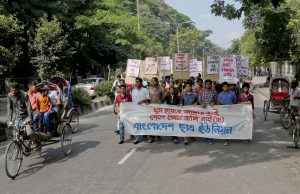On October 6, the Rapid Action Battalion (RAB), an elite anti-terrorism unit of the Bangladesh Police, arrested seven members of a new militant organization, Jama’atul Ansar Fil Hindal Sharqiya.
While members of the group have been active since 2017, it was only in 2019 that they took on the name Jama’atul Ansar Fil Hindal Sharqiya after bringing together leaders and workers of several Islamist militant groups including the Jamaat-ul-Mujahideen Bangladesh (JMB), Ansar al-Islam (AAI), and Harkat-ul-Jihad-al Islami Bangladesh (HUJI-B).
Bangladesh has three streams of Islamic militant organizations. While the AAI, which came to the fore in 2013 with the killing of atheist blogger Rajib Haider, is an al-Qaida affiliated group, Neo-JMB, which was responsible for the 2016 Holey Artisan Café attack is an affiliate of the Islamic State (IS). The third stream is the JMB, which was founded in 1998 by Afghan war veterans.
Until 2017, all these organizations were functioning side-by-side, although some JMB and AAI members left to join the Neo-JMB, which gained momentum in the aftermath of IS declaring a “Global Caliphate” in June 2014.
In an article published in The Diplomat in 2020, I said that the AAI might take advantage of the leadership crisis within the JMB and the ideological frustration of IS to press forward on its agenda of creating an Islamic India.
My anticipation of the rise of AAI was based on the weakening of the other two organizations. Several JMB leaders were arrested and executed and the JMB network was dismantled by security forces. Since June 2016, Neo-JMB was subjected to a severe military crackdown, in which over 100 militants were killed, and 500 others were arrested in over 30 police-led countrywide operations. Most importantly, IS lost its ideological basis of setting up a ‘Global Caliphate’ with the killing of its emir Abu Bakr al-Baghdadi in 2017.
It was only the AAI, which did not lose leaders and fighters. Its ideological basis too became stronger with the Rohingya crisis in Myanmar and Muslim persecution in India, as AAI/al-Qaida aim for “Gazwatul Hind” or the conquest of India.
There are several pointers to the fact that the Jama’atul Ansar Fil Hindal Sharqiya has al-Qaeda links. Its name translates to “Jama’atul Ansar in East India,” reflecting al-Qaida’s Indian subcontinental agenda. Besides, one of the seven militants arrested recently told the media that he was sent videos of Jashimuddin Rahmani, an al-Qaida ideologue, who has been in jail since 2016.
In an article published in The Diplomat in May 2022, I pointed out that Muslim militancy in Bangladesh has been going through a silent phase, a phase of recruitment and fundraising. The recent arrests of over 500 militants and the formation of a new militant organization indicate that militants have been recruiting robustly in Bangladesh.
The arrested militant, who spoke to the media said he was invited to join the new organization by his cousin. When he was not convinced to join it, he was sent a lot of videos of Muslim persecution across the globe, especially that of Muslims in Myanmar. It was the satiric cartoon of Prophet Muhammad by a French cartoonist that ultimately prompted him to join the militancy.
In my book, Islamist Militancy in Bangladesh: A Pyramid Root Cause Model, (Palgrave Macmillan, 2021), I pointed out that online radicalization involves both online and offline elements. While the content could be online, it could be channeled through close relatives, teachers and friends.
The aforementioned arrested militant said that he was first approached by his cousin who then sent him links to videos and other online material. His statement affirms that Muslim victimization discourses have become a strong recruitment tool for militant organizations. Criticism of Prophet Muhammad also acts as a triggering factor for vulnerable Muslim youth.
So how serious is the situation in Bangladesh? I would say it is not alarming yet. But it is a concerning situation.
Youth unemployment and poor governance are of concern to many Bangladeshis. Meanwhile, the presence of global jihadist groups is growing. Bangladeshis are still resilient to the call of militant ideology. While it would be an exaggeration to claim that Bangladesh will soon become like Talibanized Afghanistan, Bangladeshi militants have the capability to pose a security threat if they come together on a single platform.
Some analysts see militancy as a creation of the government. Of the 50 elites I interviewed between 2018 and 2019, several did not believe the narrative of the government and the security forces on militancy issues. Since the current government lacks legitimacy, they said, it uses action against ‘militancy’ to gain credibility. Political analyst Dr. Zahed Ur Rahman recently said that the Awami League government will bring forward militant cases before elections due to be held in December 2023 and stage some ‘jangi natok’ (militancy drama) before elections. Clearly, there is distrust between a section of the population and the security forces.
This distrust is a serious barrier in the path of the government’s efforts to combat militancy. Whatever the perception of the people, the militant challenge is real and it deserves a comprehensive strategy to overcome it.
Therefore, the Bangladesh government needs to reach a national consensus on the problem of religious extremism and adopt comprehensive Preventing Violent Extremism initiatives. Ad hoc PVE initiatives will meet with little success. Security forces have a major role to play to combat both online and offline radicalization.
































